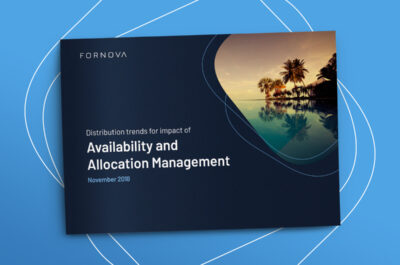The hospitality industry has been turned on its head over the past two years. Distribution, revenue management, and marketing teams have been decimated. Those who are left are under pressure like never before – not only to attract guests through their doors, but to also claw back lost profits.
In such turbulent COVID times, it will come as little surprise that hotels are struggling to find their feet when it comes to optimizing their distribution.
A new report exploring how the world's largest publicly listed hotel groups (as well as some smaller chains) performed during 2021 is due to be published by Fornova next month.
As our team is studying and analyzing the data we collected, and despite a very mixed picture among the major companies, I can already see there are significant opportunities for improvement across the board.
The hospitality industry has been turned on its head over the past two years. Distribution, revenue management, and marketing teams have been decimated. Those who are left are under pressure like never before – not only to attract guests through their doors, but to also claw back lost profits.
Optimize everything
Now, as hoteliers wait with bated breath to see what further havoc the Omicron variant will wreak on the industry, hopes of the beginning of the end have been put on ice. Yet, it is essential that in all of the turmoil, hoteliers do all they can to optimize distribution.
And what is clear is that even the major hotel groups must take a fresh look at their distribution strategies. In today's fluid environment, what has worked before for getting heads in beds may no longer be the most effective way to generate revenue and profits.
What's more, the pandemic has seen a shift in the power dynamics among some key distribution channels. Metasearch platforms stepped up their game by expanding their dedicated hospitality offerings, features and even payment models. Google, in particular, made it easier for potential guests to filter results by COVID-related criteria (e.g. flexible cancellation, children occupancy, destination restrictions) while eliminating the investment and cancellation risk of running pay-per-click campaigns (PPC) for hoteliers, by launching an alternative Pay Per Stay (PPS) bidding strategy; Google Hotel Ads can now be classed as risk-free post-guest-stay distribution commission, rather than paid-in-advance marketing expense whose results and ROI are uncertain.
At the same time, as travel restrictions began to ease in some regions, hotels experienced an increase in direct business from guests wanting greater reassurance and access to the latest local rules – more bookings were taken on brand.com websites, but also on the phone.
Distribution (whether it is direct and using PPC to bring traffic to the hotel website or indirect through OTAs etc.) is the only variable cost that a hotel can optimize and potentially reduce without damaging its service quality level, which is something that would adversely impact guest satisfaction and ultimately the property's and brand's reputation, both off and online.
Direct strategies
Direct bookings rely on building a strong brand that resonates with guests and developing incentives that foster loyalty and promote the perception that booking directly with the hotel delivers the best value for money. Both competing against and partnering with the OTAs, while gaining the edge on their hospitality peers, requires hotels to optimize every aspect of the distribution matrix.
As it stands, many hoteliers adopt a flat distribution approach, focusing only on getting the booking, not the right booking from the right channel. Because for most hotels the cost of direct is around 8% of distribution, fully understanding both the granular micro issues that affect direct bookings and the industry-wide macro challenges, as well as actively monitoring your rate integrity across channels and taking swift action in response, are key to optimizing distribution.
For hotel chains to truly gain control over their distribution, they need to see the bigger picture – learning from what global competitors are doing rather than focusing on a local rate shopper or one or two OTA providers. Aligning teams around a single hub of business intelligence data enables teams to optimize each distribution channel, stay ahead of the competition and identify opportunities to improve revenue performance and profits.
Fornova is regularly asked by asset owners, management companies, and hotel chains how their distribution health compares to their competitors and what they can do to improve. That's why we decided to adapt our industry-recognized Fornova Distribution Health Score, which the users of FornovaDI see when they log on, to create the first-ever data-based publicly available ranking for the top seven global hotel majors by Distribution Health.
One of the surprises from our review so far of distribution performance has been just how well Choice Hotels International performed. Other results of note were weaker distribution health scores for Accor and IHG (InterContinental Hotels Group) which were both substantially lower than the other chains – they both have lots of ground to make up.
We also created a second algorithm to extrapolate a Marketing Effectiveness Score. We decided to focus on metasearch, as it is the second largest source of hotel website traffic (after organic search) and because it provides us the opportunity to quantify the effectiveness of the marketing team by measuring the percentage of times that a hotel appears in the top results pages. Optimizing metasearch performance to ensure it is delivering a sound return on investment and is complementing activity with OTA partners is, of course, crucial.
For anyone who may not know, Fornova monitors billions of data points across Google, Trivago and Tripadvisor; these three are by far the most dominant players and account for almost all of the demand coming from metasearch engines.
Also worth noting is that we understand that measuring the hotel's appearance among the top metasearch results will not be a 100% true reflection of all of the marketing team's activities, but we were keen to find the most objectively measurable criteria that could be used for evaluation.
There will be exceptions, where maybe the Marketing Effectiveness Score we publish treats a chain's marketing team unfairly by ranking them low even though this is not a representation of its ability, e.g. in the case of a company that decided against investing in metasearch for budgetary reasons, etc.
When it comes to marketing, our findings suggest that the hotel groups that have had the strongest metasearch performance in the last eight months are those that have dedicated sufficient budgets to metasearch and best managed those budgets.
According to the data I have seen, the two top performers were Accor and Marriott International, which consistently outperformed their peers. Even though Choice Hotels International and Wyndham Hotels & Resorts saw an improvement in the period between April 2021 and November 2021, the performance of Choice was a little underwhelming.
Finding certainty in such uncertain times is a tough ask. Hotel owners' and operators' best chance to protect their future is to turn to data – leveraging it to optimize distribution and marketing performance, which will result in resilient revenues and profits.
*republished from phocuswire.com by writer's approval.
Dori Stein is Fornova's CEO & Founder.





























































































































































































